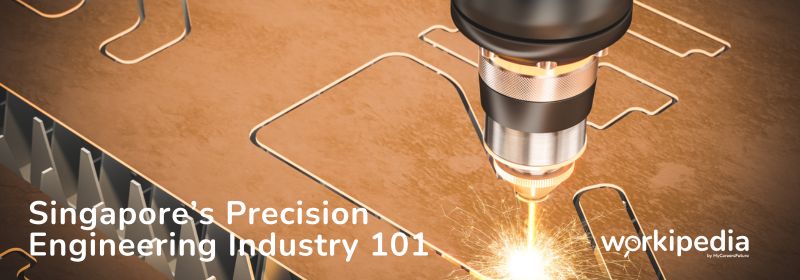About Singapore’s precision engineering sector
Precision engineering (PE) is the process of designing and manufacturing machines and components that meet precise specifications. This field requires a high degree of accuracy and attention to detail, as even minor errors can have significant consequences.
The kind of nano-scale defects made-in-Singapore wafer inspection tools can identify is comparable to spotting a strand of hair from a height of 600m.
Here are some fun facts about the sector:
- 70% of wire bonders used in the global semiconductor industry are produced in Singapore.
- We account for 10% and 30% of global output for refrigeration compressors and hearing aids, respectively.
- 20% of the global semiconductor equipment output comes from Singapore
- Nine out of the top 10 wafer fabrication equipment companies procure significantly from Singapore-based suppliers.
The PE industry employed about 95,000 workers and accounted for 11.8% of Singapore’s total output in manufacturing and 12.5% of total value-added output in 2022.
Given its crucial role in many other industries, the PE industry has grown steadily over the past decade with a compound annual growth rate (CAGR) of 5.3% and 6% achieved for total output and value-added (VA) output respectively.
There are over 100,000 jobs available on MyCareersFuture. Apply for your next job role here!
Size of the job market
In 2023, Deputy Prime Minister (DPM) Heng Swee Keat revealed that Singapore had managed to add 4,400 new manufacturing jobs in the first six months of the year, despite the industry going through economic instability.
Speaking at the Industrial Transformation Asia-Pacific (ITAP) event at the Singapore Expo, he said that these jobs showed the signs of “good progress”. Industry transformation maps (ITMs) for precision engineering previously launched in 2022 to boost resilience, and seize new market opportunities.
Over 2,700 PE firms supply critical products and expertise needed to manufacture complex components and equipment used in industries such as semiconductors, medical technology, marine, offshore and aerospace.
Singapore PE companies have a full suite of design, prototyping, production and supply chain management capabilities.
Manufacturers can easily find a “total solution” here, rather than to source from multiple suppliers.
Why is this sector important to Singapore’s economy?
The PE industry is an important pillar of the Singapore economy, both as an industry vertical and as an enabler of the manufacturing sector, serving key industries such as aerospace, oil & gas, marine and offshore, electronics and medical technology.
There are two main sub-sectors in the PE sector.
- The Component OEM sub-sector manufactures critical components such as lasers, optics, motors, sensors, precision pumps and valves.
- The Complex Equipment sub-sector manufactures semiconductor, test & measurement, Light Emitting Diodes, additive manufacturing and machining tools.
At the ITAP event, DPM Heng added: “As we enter a world of increasingly advanced and precision manufacturing, complex products will require global and cross border connectivity.
“In the face of structural changes in the world economy – brought about by new technologies and trends such as climate change and aging populations in advanced economies – the priority should instead be to encourage businesses to adjust and stay competitive and assist workers and talent to refresh their skills to preserve relevance.”
In 2022, Singapore attracted a record US$16.4 billion in Fixed Asset Investments driven by exceptional inflow of large manufacturing projects in the electronics sector.
“This is testament to the confidence that global companies have in Singapore, as a neutral and trusted venue to access global talent, capital and markets”, he concluded.
Growth areas and outlook for the precision engineering sector
The PE industry is expected to continue to grow with new advanced manufacturing areas such as advanced robotics and automation, additive manufacturing, laser and optics, sensors, advanced materials, and digital manufacturing.
According to Enterprise Singapore, the four key markets for Singapore’s PE sector include:
- China
- India
- The United States
- Southeast Asia
Four growth areas for Singapore-based companies were also highlighted as below:
1. Industry 4.0
This is a new trend of automation and data exchange in manufacturing technologies. Banking on Singapore’s reputation as a smart nation, companies can look to to improve manufacturing processes and support businesses.
Through smart technology solutions, there will be opportunities to build strong engineering design capabilities with product ideation, design and prototyping. This includes smart factories equipped with advanced sensors, embedded software and advanced technologies collect and analyse data to allow for better decision making.
Combining this with ERP, supply chain, customer service and other enterprise systems to create new levels of insights and visibility on previously siloed information, such efficiency gains and responsiveness will allow companies to stay agile and prepared to pivot when challenges arise.
2. Semiconductors
Manufacturers create parts, components and equipment that are essential to the semiconductor manufacturing lifecycle, supporting our fabs, front end and back-end processes.
Singapore is a key hub for semiconductor manufacturing, comprising 11% of the global semiconductor market and 7% of Singapore’s GDP.
Our processors and memory chips are used in applications as varied as 5G and autonomous vehicles, to data centres powering our cloud services, catalysing the rapid advancement of cybersecurity, automation, connectivity and sustainability.
Singapore provides a conducive business environment with a holistic ecosystem for semiconductors. Companies undertaking chip manufacturing have access to a good base of talent and robust supplier network.
Companies can also network through trade associations like Singapore Semiconductor Industry Association (SSIA),and develop technical competencies through R&D partners like A*STAR’s Institute of Microelectronics.
3. Robotics
Singapore has the second highest robot-to-worker density in the world. The pandemic has sped up the acceptance and adoption of robotics, solving emerging challenges like labour shortages as well as high risk jobs.
Applications of industrial robots have expanded past simple robotic arms in manufacturing and logistics, and into specialised and humanoid robots serving the healthcare, built environments, retail and construction industries.
Autonomous Guided Vehicles (AGV) and Autonomous Mobile Robots (AMR) are deployed commonly to fill roles traditionally performed by humans in a factory.
Companies can work closely with Singapore’s National Robotics Programme (NRP) to build and innovate technology, or network in the marketplace of ideas with industry leaders like Singapore Industrial Automation Association (SIAA).
4. Medical Technology (MedTech)
Precision engineering has enabled medical breakthroughs today that would not have been possible without the advent of new and innovative technologies and products.
Advanced economies are seeing rising rates of chronic disease due to unhealthy lifestyle habits and rapidly aging populations. Singapore itself is no exception to the rule, where 1 in 5 of the population is above 65.
MedTech manufacturing has grown to $19 billion in production output, more than five times the output in 2008, underlining Singapore’s role as a critical manufacturing base producing a diverse range of medical technology products, from implantable pacemakers, to contact lenses and life science instruments for global markets.
Mid-career switch: Why is the precision engineering sector a good choice?
If you enjoy working in a technologically advanced sector, formulating new products, and are keen to develop deep technical expertise, the PE sector offers opportunities to develop your passion and grow your career.
Those seeking successful careers in the PE sector can set themselves apart by developing these attributes and acquiring these soft skills in demand, according to the Skills Framework for PE by SkillsFuture:
Analytical
Enjoys analysing things from all angles and thinking of ways to make things work better.
Creative
Able to think of new and innovative ways to develop new systems and make existing ones work more effectively.
Inquisitive
Always staying on top of developments in the industry and keeping abreast of new research and ideas.
Meticulous
Pays attention to fine details and accuracy.
Structured and Systematic
Likes to work with numbers, records, or machines in an orderly manner and in compliance with procedures, regulatory and safety requirements.
Team player
Understands that each person is part of a larger team working together to bring about the success of any project.
During the Committee of Supply 2024, the Ministry of Manpower also shared it will be enhancing Workforce Singapore’s Career Conversion Programmes (CCPs), and providing employers with salary support for mid-career new hires, or existing employees to reskill and take up new job roles with good longer-term prospects.
MOM is also incorporated Structured Career Planning (SCP) workshops for employers and their human resource (HR) teams to better support their employee embarking on PE CCPs.
Through the SCP workshops, prospective employers/HR will be able to conduct meaningful one-to-one career conversations with existing employees identified. These conversations will inform reskilling efforts into new growth job roles under CCP. Line managers and HR will also be equipped with capabilities to support their workers in developing career development plans and improving workers’ career health.
What’s the salary like in the precision engineering sector?
Jobs in the precision engineering sector cover a broad spectrum of roles, and salaries do vary depending on the specific job function, level of experience, and qualifications.
Here are some examples listed on the MyCareersFuture portal:
| Role | Salary Range (Monthly) |
| Staff R&D/Product Development Engineer | $7,000 to $12,000 |
| Lead Engineer | $5,000 to $6,000 |
| Sales Manager | $6,000 to $15,000 |
| Electronics Engineer | $3,800 to $4,300 |
| Mechanical Engineering Technician | $3,000 to $3,300 |
| Staff/Principle Mechanical Engineer | $6,000 to $11,500 |
| Electrical Design Engineer | $3,800 to $4,300 |
| Precision Machinist | $1,400 to $2,100 |
| Manufacturing Engineer | $3,900 to $4,900 |
| QA Technician | $2,200 to $3,000 |
What courses or skills are needed to join the precision engineering sector?
According to the Economic Development Board, the refreshed PE Industry Transformation Map (ITM) launched in 2022 contains plans to reskill and upskill Singaporean workers in emerging technologies, so they can take on high-value roles in stronghold sectors such as Complex Equipment, new growth sub-sectors such as Additive Manufacturing, Lasers & Optics, Robotics, and mature sectors, such as Precision Modules & Components.
The skills needed to support these areas will include:
- 3D modelling
- Product design and development
- Preventive maintenance management
- Big data analytics
- Programming and coding
For the following skill paths, here are the following sub-disciplines that are valued:
Robotics and Automation Skills
- Automated Operation Monitoring
- Automated System Design
- Automation Process Control
- Automation System Maintenance
Digital Manufacturing Skills
- Augmented Reality Application
- Internet of Things Management
- User Interface Design
- User Experience Design
- Virtual Reality Application
Advanced Manufacturing Skills
- Additive Manufacturing
- Metal-based Additive Manufacturing
- Polymeric Additive Manufacturing
- Laser and Optics
Data Science Skills
- Data Analytics System Design
- Data Synthesis
Types of jobs in the precision engineering sector
Some of the common roles in the sector include the following:
- Machinist/Technician
- Senior Machinist/Senior Technician
- Process Specialist/Shift Leader/Team Leader
- Automation Coordinator/Robot Coordinator
- Master Craftsman
- Assistant Engineer/Associate Engineer
- Engineer/Senior Engineer/Chief Engineer
- Product Engineer/Product Designer
Jobseekers or mid-career switchers who are keen on joining the PE sector can get support and On-the-Job Training by signing up for the following Career Conversion Programmes for the precision engineering sector by Workforce Singapore:
- CCP for Advanced Manufacturing Operator (RnF)
- Precision Engineering: CCP for Advanced Manufacturing Engineer/ Assistant Engineer (PMET)
Getting excited about joining the industry? Read on for more insights and information on how you can join Singapore’s precision engineering sector, and what to look forward to below!

3 Types of Engineering Jobs That Could Be Your Best Match















